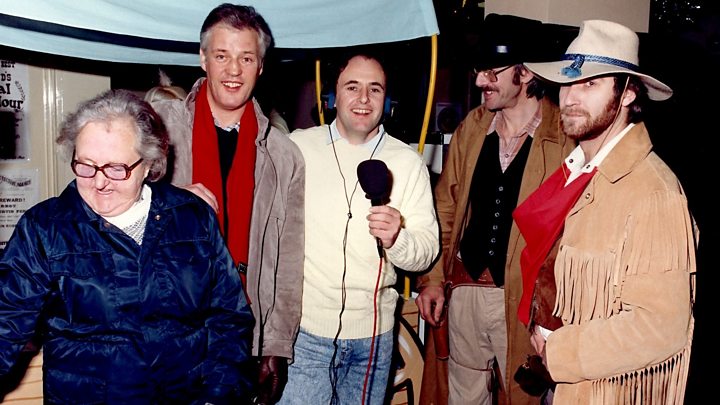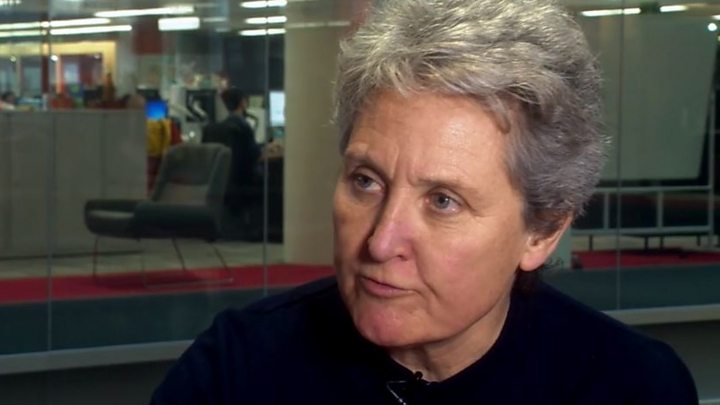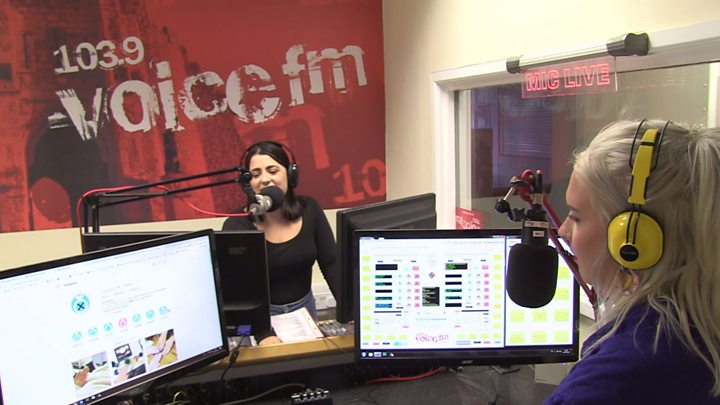Plymouth Sound has already reached two-thirds of the city’s radio listeners
With half of all local commercial radio stations in the UK now owned by three companies, and national programs increasingly replacing regional stations, the future of truly local radio seems uncertain.
In 20 years, local listening has dropped from 40% of the market to less than 25%, and many stations have disappeared or been absorbed in consolidated “network centers”.
Last year, 36 local business breakfasts were replaced by two national programs, and 10 entire regional sites were completely closed.
“We have seen many local radio presenters lose their jobs and it is quite a sad situation across the country,” said Stuart Clarkson, associate editor of RadioToday.
He estimates that more than 250 broadcasters will lose their jobs due to the replacement of local broadcasting by national programming as the industry continues to shrink.
Image copyright
Getty Images
Heart presents national stars like Jamie Theakston, Amanda Holden and Emma Bunton
“Things have also changed a lot socially,” said Clarkson. “Nowadays, people who listen to the radio tend to want to hear music. Local radio is less important now and I think that with the change we have had in social media, people are getting their information and their local content from different places. “
He said that more and more “heritage” names in broadcasting are being replaced by big brands like Heart, Capital and Smooth.
“So Jamie Theakston and Amanda Holden are on local radio stations across the country,” he added.
Image copyright
Plymouth sound
Plymouth Sound Radio closed its local studios in August 2010
One of the top performing stations in the local independent radio market was Plymouth Sound, which at one point reached 63% of the city’s population.
The station controller was Louise Churchill, who also made a phone call for almost two decades. She says their philosophy was “to be for the community, with the community and about the community”.
“You had the chance to call the station and express your views on the government or the council, or the local golf club … and you would be heard all over the city,” she adds. .
Presenter Ian Calvert says the station team also lived locally. “We knew all the roads, we knew most of the people who owned stores, shops and pub owners. It was like Emmerdale or Dibley.”
He added that at the peak of the station’s popularity “it went crazy, it was like pop-star stuff” but “those days are over”.

Media playback is not supported on your device
In the years following its successful launch in 1975, Plymouth Sound Radio changed ownership, became less local, and was renamed Heart in 2009.
The station finally closed its local studios in August 2010, and its plight hit many stations across the country.
Technology has enabled radio groups to consolidate their assets and broadcast from large network centers, such as those operated today by Global Radio in London and the Bauer Media Group in Manchester.
These mainly provide national programs, with some local content to meet the relaxed local and regional requirements of Ofcom.
Plymouth Sound Radio changed ownership and was renamed Heart in 2009
According to a 2018 report from the Media Reform Coalition, more than half of the 329 stations operating local analog radio licenses in the UK are owned by three media companies.
A vital public service
With the majority of commercial stations reducing their local production, in some areas, the BBC was the only remaining local broadcaster.
And the network’s network of 39 stations has grown from 10 million listeners per week in the 1990s to a record 5.6 million last year.
An advertisement for local BBC radio was produced in 1993
“Young audiences are interested in local things, so we need to deliver this material in the best possible way,” said Chris Burns, audio and digital manager for BBC England.
She said that in the future, content could be delivered in the form of a bite using tools such as the BBC Sounds service.
“We need to find new ways to reach these audiences while preserving the best of what we are already doing.”

Media playback is not supported on your device
Burns says still images from traditional BBC local radio provide a vital public service, such as during the Sheffield floods in 2019, when the station held a charity concert to help residents affected by the floods.
Image copyright
AFP / Getty Images
BBC Sheffield broadcast throughout the 2019 floods
“The television cameras may have disappeared, but the reality is that the aftereffects are still something that people are going through and that is what local radio can give you, I think no one else can do. “, she says.
With technological advances, it is increasingly possible for people to develop and operate their own local stations.
Former BBC and local commercial radio presenter Duncan Warren and his son created Goldmine, which broadcasts on digital radio through Cornwall.
“56% of Cornwall listeners are now listening on DAB, so we have become the main listening force,” he says.
Goldmine broadcasts on digital radio across Cornwall
Stuart Clarkson of RadioToday also observed how community radio has developed in the industry.
He said, “We have a few hundred community radio stations scattered across the country and the plan is for more of them to appear.”
Southampton’s Voice FM is a community radio station with a full program of local programs.
Presenter Daniela Da Palma said they are trying to introduce local guests and focus on the issues that affect the local community, which makes them “very special”.

Media playback is not supported on your device
But many community radio operators have expressed frustration with Ofcom’s funding restrictions, which means that the majority of stations can only raise 50% of their revenues from commercial sources.
Tony Gillham, director of Black Cat Radio in St Neots, says that with more money they could “compete with the big boys on an equal footing” and provide much better service for the region.
He added: “The big boys are there to make money, we are there to make programs, this is exactly where we started in the 70s”.
The village speaker: what happened to local radio? was released on March 6, 2020 and is now available on the BBC iPlayer.



